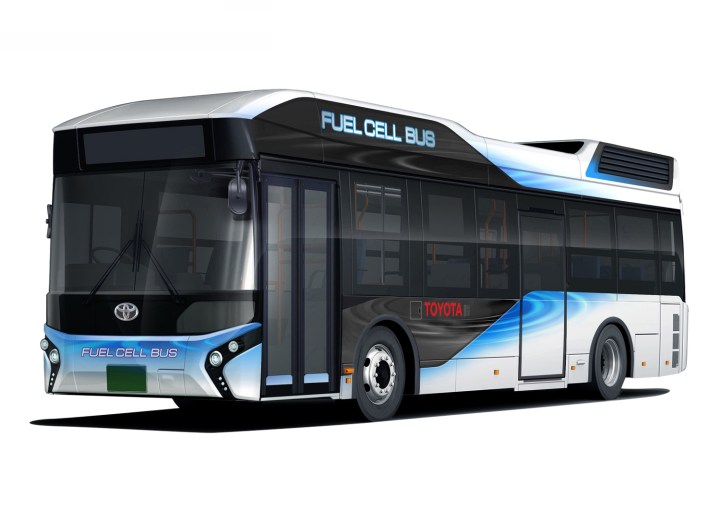
Alongside its Mirai sedan, Toyota will begin selling fuel-cell buses in Japan next year. It already has an agreement with the Tokyo Metropolitan Government to supply two buses for transit service, and hopes to have a fleet of 100 buses in operation in time for the 2020 Tokyo Olympics. Deliveries will ramp up in 2018 to meet that goal, Toyota said in a statement.
Known simply as the Toyota FC Bus, the vehicle is the result of development work conducted by the carmaker and its truck division, Hino. Each bus can hold 76 passengers, including 26 seated and 50 standing. Power comes courtesy of a pair of 114-kilowatt (152-horsepower) electric motors. In addition to the onboard fuel-cell stack, the bus has a nickel-metal hydride battery pack to provide supplemental power.
Read more: Chevy built a fuel-cell pickup truck for the U.S. army
The bus also has the ability to discharge electricity into the grid, meaning it can be used as a source of emergency power during outages. Japanese automakers and regulators have been emphasizing this ability in the wake of the 2011 earthquake and tsunami, which led to the Fukushima Daiichi nuclear disaster. Provided it has a full tank of hydrogen, Toyota says the bus can be used to power emergency evacuation sites like school gymnasiums, or home appliances.
Enthusiasm for hydrogen is fairly widespread in Japan. Prime Minister has discussed a “hydrogen society,” where fuel cells power buildings and infrastructure as well as vehicles. Toyota also helps to develop “stationary fuel cells for use in homes,” which could compete with the standalone lithium-ion battery packs produced by Tesla and others for home energy storage.
Fuel-cell technology will probably have a big presence at the 2020 Olympics, as both the Japanese government and corporations try to promote it. Given the small number of operating hydrogen stations, though, it may be a while before fuel-cell buses become a practical option for world cities.


